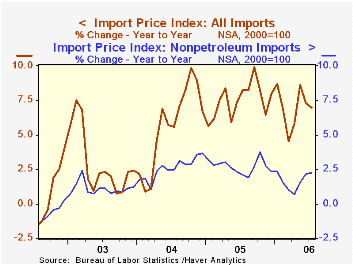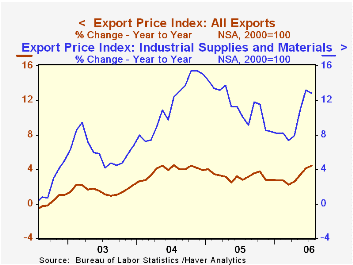 Global| Aug 10 2006
Global| Aug 10 2006U.S. Import Prices Up 0.9%
by:Tom Moeller
|in:Economy in Brief
Summary
Total import prices were up 0.9% in July about matching consensus expectations for an increase of 0.8%. Less petroleum, import prices were down 0.10% from the previous month led by a 0.9% drop in import prices of nonoil industrial [...]

Total import prices were up 0.9% in July about matching consensus expectations for an increase of 0.8%.
Less petroleum, import prices were down 0.10% from the previous month led by a 0.9% drop in import prices of nonoil industrial supplies and materials after three consecutive months of increases. Lower import prices of nonferrous metals, natural gas and building materials contributed to the decline in prices of nonoil industrial supplies and materials although higher import prices of chemicals and finished metals offset some of the decline.
Capital goods prices rose 0.1% (-0.44% y/y) while prices for nonauto consumer goods were down 0.1% from the previous month and unchanged from the previous year.
Prices of petroleum imports increased 4.7% in July following a 1.4% decline in June. Brent crude oil prices jumped to $73.77 per barrel in July from a June average of $68.56.
During the last ten years there has been a 66% (negative) correlation between the nominal trade-weighted exchange value of the US dollar vs. major currencies and the y/y change in non oil import prices. The correlation is a lower 47% against a broader basket of currencies and a lower 57% against the real value of the dollar.
Export prices were up 0.4% in July led by increases in export prices of both agricultural and nonagricultural commodities.
| Import/Export Prices (NSA) | July | June | Y/Y | 2005 | 2004 | 2003 |
|---|---|---|---|---|---|---|
| Import - All Commodities | 0.9% | 0.0% | 7.0% | 7.5% | 5.6% | 2.9% |
| Petroleum | 4.7% | -1.4% | 29.6% | 37.6% | 30.5% | 21.0% |
| Non-petroleum | -0.1% | 0.4% | 2.3% | 2.7% | 2.6% | 1.1% |
| Export - All Commodities | 0.4% | 0.7% | 4.4% | 3.2% | 3.9% |
Tom Moeller
AuthorMore in Author Profile »Prior to joining Haver Analytics in 2000, Mr. Moeller worked as the Economist at Chancellor Capital Management from 1985 to 1999. There, he developed comprehensive economic forecasts and interpreted economic data for equity and fixed income portfolio managers. Also at Chancellor, Mr. Moeller worked as an equity analyst and was responsible for researching and rating companies in the economically sensitive automobile and housing industries for investment in Chancellor’s equity portfolio. Prior to joining Chancellor, Mr. Moeller was an Economist at Citibank from 1979 to 1984. He also analyzed pricing behavior in the metals industry for the Council on Wage and Price Stability in Washington, D.C. In 1999, Mr. Moeller received the award for most accurate forecast from the Forecasters' Club of New York. From 1990 to 1992 he was President of the New York Association for Business Economists. Mr. Moeller earned an M.B.A. in Finance from Fordham University, where he graduated in 1987. He holds a Bachelor of Arts in Economics from George Washington University.
More Economy in Brief
 Global| Feb 05 2026
Global| Feb 05 2026Charts of the Week: Balanced Policy, Resilient Data and AI Narratives
by:Andrew Cates






